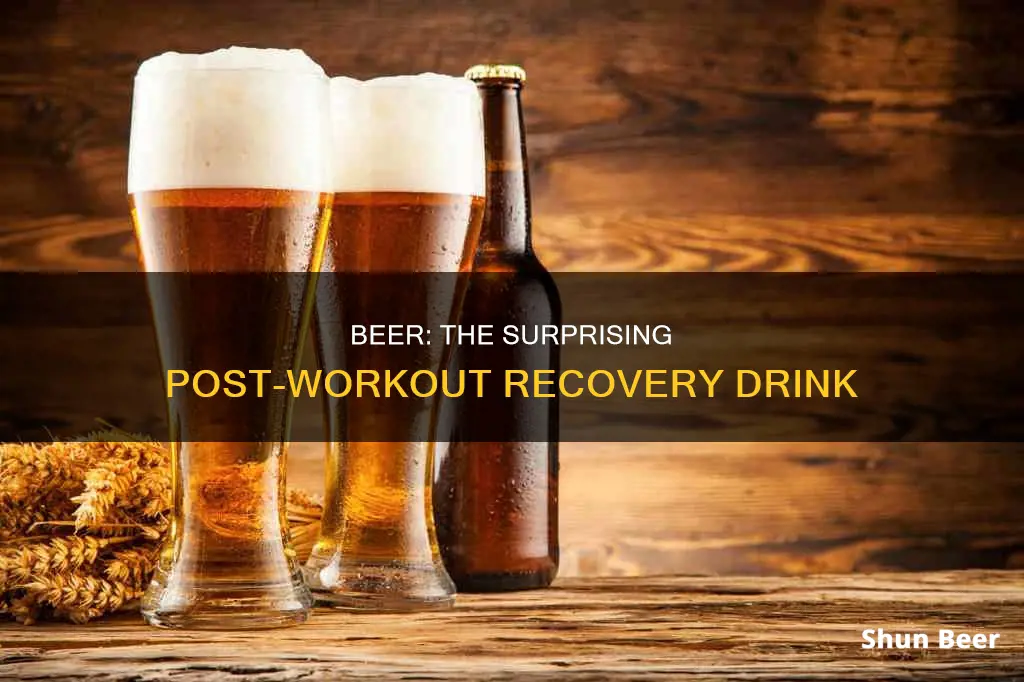
Beer, long associated with poor decision-making and dehydration, is now being marketed as a recovery drink for athletes. Lower-alcohol, lower-calorie beers are being positioned as a post-workout option, with some brands even setting up shop at the finish lines of races and triathlons. But is beer a good recovery drink?
Well, it depends. A 2021 study found that light beer, defined as having less than 4% ABV, could be an effective post-workout recovery drink, similar to water in some aspects. Beer contains carbohydrates and sodium, which can aid in rehydration and recovery. It also has polyphenols, which are natural chemicals found in plants that can have anti-inflammatory and antioxidant properties. However, the alcohol in beer can undermine these potential benefits. Once you go over 4% ABV or have more than one or two 12-ounce low-ABV beers, the benefits decline, and you risk higher water loss, reduced muscle gains, and other issues.
So, while an ice-cold, low-ABV brew after a workout may not be the worst idea, it's important to remember that alcohol is still alcohol, and excessive consumption can lead to negative health consequences.
What You'll Learn
- Beer can be a good recovery drink when consumed in moderation
- Beer has carbohydrates and sodium, aiding rehydration
- Beer has polyphenols, which can reduce the risk of respiratory infections
- Non-alcoholic beer is better for recovery than alcoholic beer
- Beer is a good recovery drink because it is tasty and social

Beer can be a good recovery drink when consumed in moderation
Light or low-ABV beer, defined as having less than 4% ABV, can be an effective post-workout recovery drink. Beer has carbohydrates and sodium, which can be beneficial after exercise. It also has polyphenols, which are natural chemicals found in plants that have anti-inflammatory and antioxidant properties. These polyphenols can help reduce the risk of respiratory infections associated with heavy training.
However, it is important to note that once you go over 4% ABV or have more than one or two 12-ounce low-ABV beers, the benefits decline. Higher alcohol content can lead to issues such as increased water loss, reduced muscle gains, impaired training, and a potential increase in body fat. Additionally, beer does not contain protein, which is important for recovery when ingested immediately post-exercise. Therefore, it is recommended to pair beer with food or a non-alcoholic beverage to replace lost electrolytes and support optimal recovery.
While beer can be a good recovery drink in moderation, it is not a direct replacement for sports drinks or other specialized recovery beverages. It is also important to prioritize hydration and ensure adequate fluid intake during and after exercise.
Andre's Beer Consumption: A Curious Investigation
You may want to see also

Beer has carbohydrates and sodium, aiding rehydration
Beer has long been associated with socialising and celebration, and now it seems that it may also have a place in the world of sports recovery. While beer is not a sports drink, it does contain carbohydrates and sodium, which can aid rehydration and help with fluid loss. This is especially true of non-alcoholic or low-alcohol beers, which can be as effective as water in aiding rehydration after exercise.
A 2015 study published in the Journal of the International Society of Sports Nutrition found that "a moderate beer intake has no deleterious effects on markers of hydration in active individuals." In other words, a couple of beers—especially those with low alcohol content—are fine, and may even be beneficial, thanks to the carbohydrates, electrolytes, and sodium they contain. These are all things that can help with fluid loss and aid rehydration.
Brad Schoenfeld, PhD, a Men's Health exercise science advisor and associate professor at Lehman College, agrees. He says that "beer has carbohydrates and some sodium where water does not, which could be beneficial post-exercise." Schoenfeld also points out that beer is tastier than water, which may make people more inclined to rehydrate.
However, it's important to note that the benefits of beer as a recovery drink decline once the alcohol content goes over 4%. Jaison Wynne, a PhD student at Old Dominion University and co-author of a review on beer and exercise, says that "once you go over 4% alcohol content, or have more than one or two 12-ounce low ABV beers, that's where the benefits decline." At that point, you may start to experience issues such as higher water loss, reduced muscle gains, and impaired training.
It's also worth noting that the carbohydrates in beer are not as beneficial as those from other sources, such as a snack with carbs and protein. Schivonne Keller, a registered dietician, says that "beer won't do much for your glycogen stores, but as long as you're having a snack with carbs and protein, a beer or two probably isn't harmful."
So, while beer may not be the first choice for a recovery drink, it does have some rehydration benefits thanks to its carbohydrate and sodium content. However, it's important to consume it in moderation and alongside other sources of carbohydrates and protein for optimal recovery.
Veterans Day: Beer and Celebration
You may want to see also

Beer has polyphenols, which can reduce the risk of respiratory infections
Beer has been found to contain polyphenols, which are natural chemicals found in plants with anti-inflammatory and antioxidant properties. These polyphenols can help reduce the risk of respiratory infections, which are common after heavy exercise. A 2011 study from the Technical University of Munich found that runners who drank non-alcoholic beer before and after a marathon had fewer upper respiratory infections than those who drank a placebo.
Polyphenols are present in both alcoholic and non-alcoholic beer, but the alcohol in regular beer may reduce the positive effects of polyphenols. A study by María P. Portillo found that while polyphenols have interesting antioxidant effects, alcohol can simultaneously trigger inflammation. Therefore, non-alcoholic beer may be a better choice for those looking to reduce their risk of respiratory infections.
Another study, published in the International Journal of Sport Nutrition and Exercise Metabolism, found that light beer, defined as having less than 4% ABV, can be an effective post-workout recovery drink. The study also found that adding sodium to non-alcoholic beer can improve its rehydration properties, although this may create a taste problem. However, it is important to note that consuming more than one or two 12-ounce low ABV beers can negate the benefits, leading to issues such as higher water loss and reduced muscle gains.
While beer may have some potential benefits as a recovery drink, it is important to consume it in moderation and pair it with food or non-alcoholic beverages to avoid dehydration. Additionally, non-alcoholic beer contains calories, typically around 50 to 90 per can or bottle, which is a consideration for those concerned about weight control.
Beer Distribution in Georgia: A Complex System Explained
You may want to see also

Non-alcoholic beer is better for recovery than alcoholic beer
Beer has long been associated with socialising and celebration, and it's no different when it comes to sports. The idea of an ice-cold beer after a long run or sporting event is becoming increasingly popular. But is beer a good recovery drink?
Well, it depends. Alcoholic beer is a mild diuretic, which means it will make you urinate more and can lead to dehydration. This is counterproductive if you're trying to rehydrate after an intense workout. On the other hand, non-alcoholic beer can be a reasonable recovery drink. It provides water, carbohydrates, and polyphenols, which are natural chemicals found in plants that have anti-inflammatory and antioxidant properties.
So, when it comes to recovery, non-alcoholic beer is a better choice than alcoholic beer. Here's why:
Rehydration
Non-alcoholic beer can help with rehydration after a workout. Alcoholic beer, on the other hand, can contribute to dehydration due to its diuretic effect. In a 2016 study, male athletes who drank non-alcoholic beer before a workout were less dehydrated than those who drank regular beer, and their hydration levels were similar to those who drank water.
Inflammation and Immune Response
The polyphenols in non-alcoholic beer have been found to reduce inflammation and improve immune response. A 2012 study showed that non-alcoholic beer drinkers had lower markers of inflammation and a lower incidence of upper respiratory tract infections (URTIs), which are common after intense exercise.
Electrolyte Balance
Non-alcoholic beer can help maintain electrolyte balance during exercise. It has a better ratio of sodium to potassium, which is important for rehydration and maintaining proper fluid balance in the body.
Calorie Content
Non-alcoholic beers are generally lower in calories than their alcoholic counterparts because each unit of alcohol contains a significant number of calories. This can be beneficial for those watching their weight while also wanting to enjoy a beer.
While non-alcoholic beer has its benefits, it's important to remember that it's not a perfect sports drink. It is still a source of calories, and it may not be as effective as traditional sports drinks in terms of replenishing electrolytes. Additionally, beer, even the non-alcoholic variety, is fizzy and can cause gastrointestinal discomfort during or immediately after exercise.
In conclusion, while beer may have some benefits as a recovery drink, non-alcoholic beer is a better choice than alcoholic beer for rehydration, reducing inflammation, and supporting the immune system. However, it should be consumed in moderation and as part of a balanced approach to recovery and overall health.
Beer Fast: Does It Work Quickly?
You may want to see also

Beer is a good recovery drink because it is tasty and social
It's also tasty and refreshing, which is important when you're looking to rehydrate after a workout. A light or low-ABV beer (less than 4% ABV) can be an effective post-workout recovery drink. It has carbohydrates and sodium, which can be beneficial post-exercise, and it's more enjoyable to drink than water.
Some people might be put off by the idea of drinking beer after a workout, but as long as you're consuming enough carbohydrates and protein, and you're not overdoing it on the alcohol, a beer or two is unlikely to be harmful. In fact, it can be a great way to relax and socialise with fellow athletes.
So, if you're looking for a tasty and social recovery drink, beer is a great option. Just remember to drink in moderation and make sure you're also getting the nutrients your body needs to recover effectively.
Monks and Beer: A Spiritual Perspective on Drinking
You may want to see also
Frequently asked questions
Beer has carbohydrates, sodium, and polyphenols, which can help with hydration, immune-boosting, and rehydration after a workout.
Light or low-ABV beer, which is defined as having less than 4% ABV, is the best option as a recovery drink.
Beer is a mild diuretic, which can be counterproductive if you need to replace fluids after exercise. It can also affect how well your muscles strengthen and impair your reaction time and balance.
Beer has been found to be as good as or better than regular sports drinks. It has also been found to be as effective as water in some aspects.
Beer should be drunk primarily after sports for rehydration.







